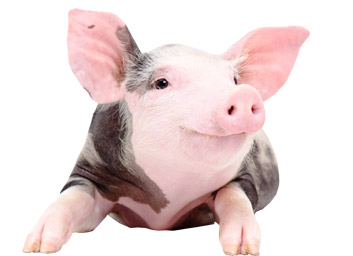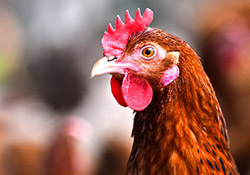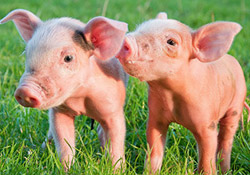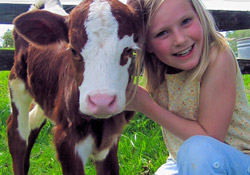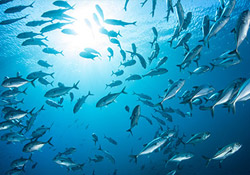Animals
If you ever have the opportunity to spend time with chickens, turkeys, pigs or cows, you’ll discover that, like our dogs and cats, they have unique personalities; they’re individuals. They’re curious, intelligent and caring. And like all animals, they experience emotions such as pain, fear and sadness.
Yet, every year in the U.S., nine billion farmed animals (not including fish) are confined in filthy conditions on factory farms, packed into trucks and sent to be slaughtered. Thankfully, every time we sit down to eat we can stand up for animals, simply by choosing to leave them off of our plates.
Smart Chickens
 Sadly, chickens raised for food are denied the ability to perform many of their most natural behaviors and instead are severely overcrowded inside sheds or cages.
Sadly, chickens raised for food are denied the ability to perform many of their most natural behaviors and instead are severely overcrowded inside sheds or cages.
Egg-laying chickens are perhaps the most abused of all farmed animals. Males born in this industry are killed on their first day of life, since they don’t lay eggs, while females are forced to spend nearly their entire lives in barren wire “battery” cages that are so small, they can’t even spread their wings, let alone walk. Experts agree such intensive confinement causes immense suffering, and it’s been banned in other countries. Yet battery cages remain standard practice in the U.S. egg industry.
Chickens raised for meat have been genetically selected in a different way than those raised for eggs. Referred to in the industry as “broilers,” these birds are crammed inside massive warehouses where they’re forced to stand, eat and sleep in their own waste. Bred for rapid growth that’s abnormal and unnatural, they often suffer from various ailments and painful deformities. Less than two months old, these birds are still babies when they’re packed on trucks and shipped to slaughter.
Playful Pigs
If you’ve ever had a chance to meet a pig, it’s hard not to notice how strikingly similar these animals are to the beloved dogs we share our homes with. 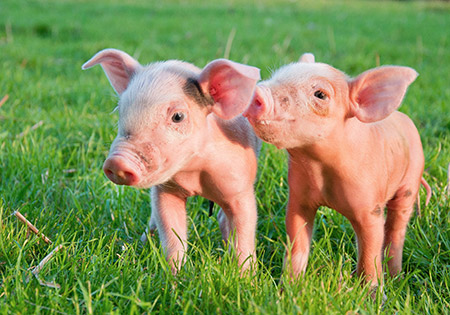 These highly social animals possess an amazing capacity for love, joy and sorrow — and they’re remarkably intelligent. In fact, they’re considered one of the top five most intelligent non-human animals, even smarter than dogs. They can quickly learn their own names and how to sit for treats. They can even play video games and use mirrors to find food that would otherwise be hidden from view.
These highly social animals possess an amazing capacity for love, joy and sorrow — and they’re remarkably intelligent. In fact, they’re considered one of the top five most intelligent non-human animals, even smarter than dogs. They can quickly learn their own names and how to sit for treats. They can even play video games and use mirrors to find food that would otherwise be hidden from view.
Sadly, pigs on factory farms live miserable lives, void of behavioral stimulation. At birth, their tails are cut off and males have their testicles cut off without painkillers. Crammed inside barren concrete pens, they quickly get bored and frustrated. After about six months, they’re loaded onto trucks and – without food or water, sometimes for 24 hours or longer – transported to slaughter.
Mother pigs raised on breeding factory farms are routinely immobilized in narrow gestation crates barely wider than their own bodies. Unable to even turn around, a mother pig will suffer for months on end intensively confined before being moved to a “farrowing” crate where, still unable to turn around, she’ll give birth. The captivity, boredom, fear and abuse these pigs face is unimaginable.
Social Cows
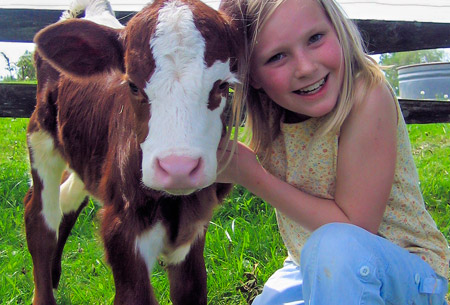 Like us, cows produce milk for their young. Yet, on dairy factory farms, milk production is manipulated through constant cycles of artificial insemination and birth — and, in order to collect their milk for humans to drink, their calves are immediately taken away. This separation causes extreme grief for both mother and calf. While female calves are likely to join their mother on the dairy line, male calves don’t produce milk and are considered unwanted byproducts. Males are often raised for a few months and slaughtered at a young age so their meat can be marketed as veal. After a few years of constant impregnation, milk production may decline to a level deemed unprofitable in the industry. These “spent” cows are shipped to slaughter and often turned into fast-food hamburgers or pet food.
Like us, cows produce milk for their young. Yet, on dairy factory farms, milk production is manipulated through constant cycles of artificial insemination and birth — and, in order to collect their milk for humans to drink, their calves are immediately taken away. This separation causes extreme grief for both mother and calf. While female calves are likely to join their mother on the dairy line, male calves don’t produce milk and are considered unwanted byproducts. Males are often raised for a few months and slaughtered at a young age so their meat can be marketed as veal. After a few years of constant impregnation, milk production may decline to a level deemed unprofitable in the industry. These “spent” cows are shipped to slaughter and often turned into fast-food hamburgers or pet food.
Cows raised for beef are routinely subjected to painful procedures with no anesthesia or pain relief such as being castrated and having their sensitive horns cut off. For the last six months of their lives, they live in crowded, barren, manure-filled feedlots where they’ll be fed an unnatural diet of grains and antibiotics to promote weight gain right before slaughter.
Feeling Fish
 Sadly, overfishing is putting many species on the verge of extinction. The number of aquatic animals killed for human consumption is not known — in the US, fish killed for food are not counted as individuals; they’re tracked by total pounds. Annual estimates, however, exceed 15 billion animals killed. Commercial fishers use trawling nets that can be miles long, catching thousands of fish at a time, along with countless non-target animals referred to as “by-catch,” which often includes dolphins, turtles, whales, sharks, birds, and seals.
Sadly, overfishing is putting many species on the verge of extinction. The number of aquatic animals killed for human consumption is not known — in the US, fish killed for food are not counted as individuals; they’re tracked by total pounds. Annual estimates, however, exceed 15 billion animals killed. Commercial fishers use trawling nets that can be miles long, catching thousands of fish at a time, along with countless non-target animals referred to as “by-catch,” which often includes dolphins, turtles, whales, sharks, birds, and seals.
Fish factory farms, collectively known as aquaculture, are sadly on the rise. Intensively confined in overcrowded cages in the sea, these fish live in filthy conditions and are pumped full of antibiotics. Their lives are filled with misery and often end by being sliced open with a knife while still fully conscious.

